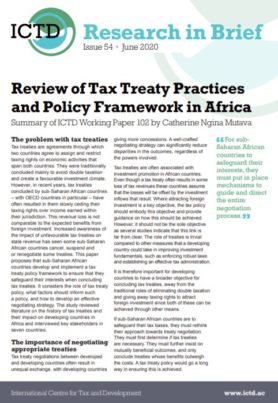Research in Brief 54
Tax treaties are agreements through which two countries agree to assign and restrict taxing rights on economic activities that span both countries. They were traditionally concluded mainly to avoid double taxation and create a favourable investment climate. However, in recent years, tax treaties concluded by sub-Saharan African countries – with OECD countries in particular – have often resulted in them slowly ceding their taxing rights over income earned within their jurisdiction. This revenue loss is not comparable to the expected benefits from foreign investment. Increased awareness of the impact of unfavourable tax treaties on state revenue has seen some sub-Saharan African countries cancel, suspend and or renegotiate some treaties. This paper proposes that sub-Saharan African countries develop and implement a tax treaty policy framework to ensure that they safeguard their interests when concluding tax treaties. It considers the role of tax treaty policy, what factors should inform such a policy, and how to develop an effective negotiating strategy. The study reviewed literature on the history of tax treaties and their impact on developing countries in Africa and interviewed key stakeholders in seven countries.
